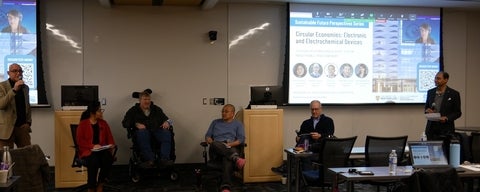Sustainable Future Perspectives: Circular Economy
The third Sustainable Future Perspectives discussion was held in November and hosted by the Waterloo Institute for Nanotechnology (WIN) and the Department of Chemical Engineering.
The discourse, titled “Circular Economies: Electronic and Electrochemical Devices” was the capstone for the ongoing theme of electronic waste. The inaugural discourse in the series focused on recycling electronic components and reducing global waste. The second discussion in the series covered the topic of the recycling of battery materials.
The event centered on how research and training at the University of Waterloo can contribute to several vital areas in the circular economy. These areas include recycling battery materials, researching new materials to create better batteries, and developing proactive solutions to mitigate delays in setting up new mines. There was also a discussion about the best ways to assist industrial partners in remaining financially stable during these lag times. The suggestions put forth included creating improved business models and strengthening government policies regarding mining and recycling.

The series moderators were Professors Mario Ioannidis, Chair of the Department of Chemical Engineering and Sushanta Mitra, Executive Director of WIN. The esteemed panel was comprised of Professors Komal Habib and Steven Young from the School of Environment, Enterprise, and Development (SEED), Professor Mike Fowler from the Department of Chemical Engineering and a member of WISE, (Waterloo Institute for Sustainable Energy), Professor Ting Tsui, Director of the Nanotechnology Engineering Program, and Dr. Asmae Mokrini from the National Research Council (NRC).
The panel weighed in on several critical areas.
In December of 2022, the Canadian government passed legislation decreeing that all new passenger vehicles and light trucks sold in Canada after 2035 must be zero-emissions vehicles. According to Mokrini, there are currently 35 million electric vehicles (EVs) in Canada. The quantity of critical minerals that will be needed to reach the government’s target to feed the EV industry is staggering.
“The creation of a circular economy will not only be for environmental reasons, but it’s also going to be a necessity. We cannot make it without recycling those materials,” says Mokrini. “We will need to develop other technologies and explore using alternative battery materials such as sodium and aluminum to be able to make that transition.”
Young asserted that six or eight times more materials will be required to meet this goal and feed this energy transition. Part of the challenge in acquiring the necessary minerals through the mining process is the prolonged length of time it takes, (up to 15 years), to get approvals to open a new mine. He argued that it is easy to announce the opening of a new battery plant, however, it's not as easy to open a new mine. Battery plants will be struggling to obtain feedstock material from mines. A parallel challenge is to mine in a sustainable and environmentally responsible way, including urban mining.
Habib stated that recycling should be the last resort of a circular economy. Rather, it is critical to keep our already-mined resources, in our existing technologies, at maximum functional efficiency for as long as possible. She argued that more focus should be placed on reducing what we consume and reusing materials.
Tsui brought up the idea of de-fashioning electronics, to show people that they do not need a new smartphone every year. Companies exist to make a profit, and so it is the consumer’s responsibility to consume responsibly.
The emerging global expectation for extended producer responsibility was discussed by the panel. This idea links the producer of the new product to the end of the life of the product, making it the producer’s obligation for product end-of-life management. This will force producers to take responsibility for their greenhouse gas footprint.
Researchers must form interdisciplinary collaborations to accelerate training in the service of sustainability.